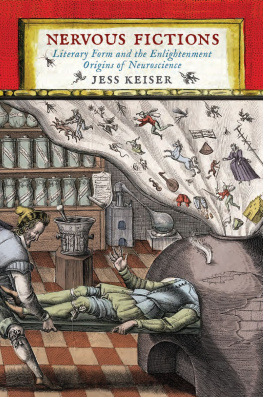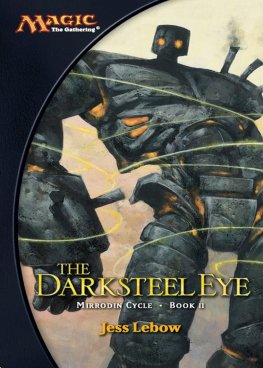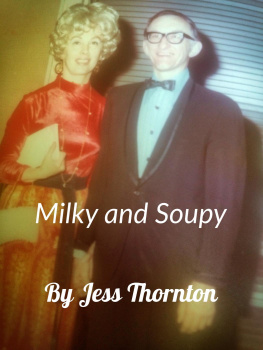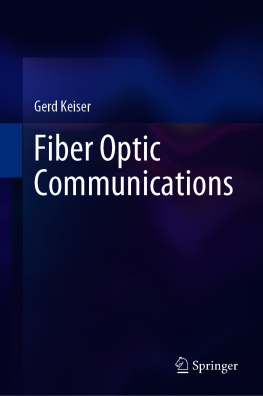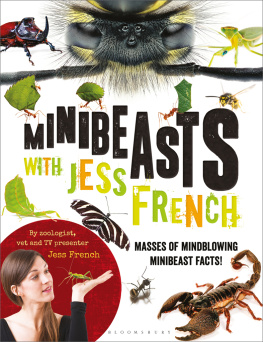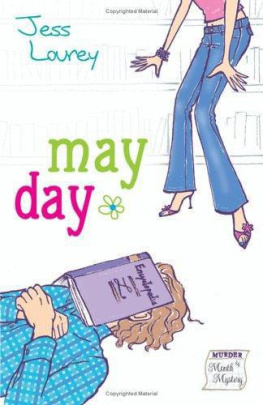Jess Keiser - Nervous Fictions
Here you can read online Jess Keiser - Nervous Fictions full text of the book (entire story) in english for free. Download pdf and epub, get meaning, cover and reviews about this ebook. year: 2020, publisher: University of Virginia Press, genre: Religion. Description of the work, (preface) as well as reviews are available. Best literature library LitArk.com created for fans of good reading and offers a wide selection of genres:
Romance novel
Science fiction
Adventure
Detective
Science
History
Home and family
Prose
Art
Politics
Computer
Non-fiction
Religion
Business
Children
Humor
Choose a favorite category and find really read worthwhile books. Enjoy immersion in the world of imagination, feel the emotions of the characters or learn something new for yourself, make an fascinating discovery.
- Book:Nervous Fictions
- Author:
- Publisher:University of Virginia Press
- Genre:
- Year:2020
- Rating:5 / 5
- Favourites:Add to favourites
- Your mark:
- 100
- 1
- 2
- 3
- 4
- 5
Nervous Fictions: summary, description and annotation
We offer to read an annotation, description, summary or preface (depends on what the author of the book "Nervous Fictions" wrote himself). If you haven't found the necessary information about the book — write in the comments, we will try to find it.
Nervous Fictions — read online for free the complete book (whole text) full work
Below is the text of the book, divided by pages. System saving the place of the last page read, allows you to conveniently read the book "Nervous Fictions" online for free, without having to search again every time where you left off. Put a bookmark, and you can go to the page where you finished reading at any time.
Font size:
Interval:
Bookmark:
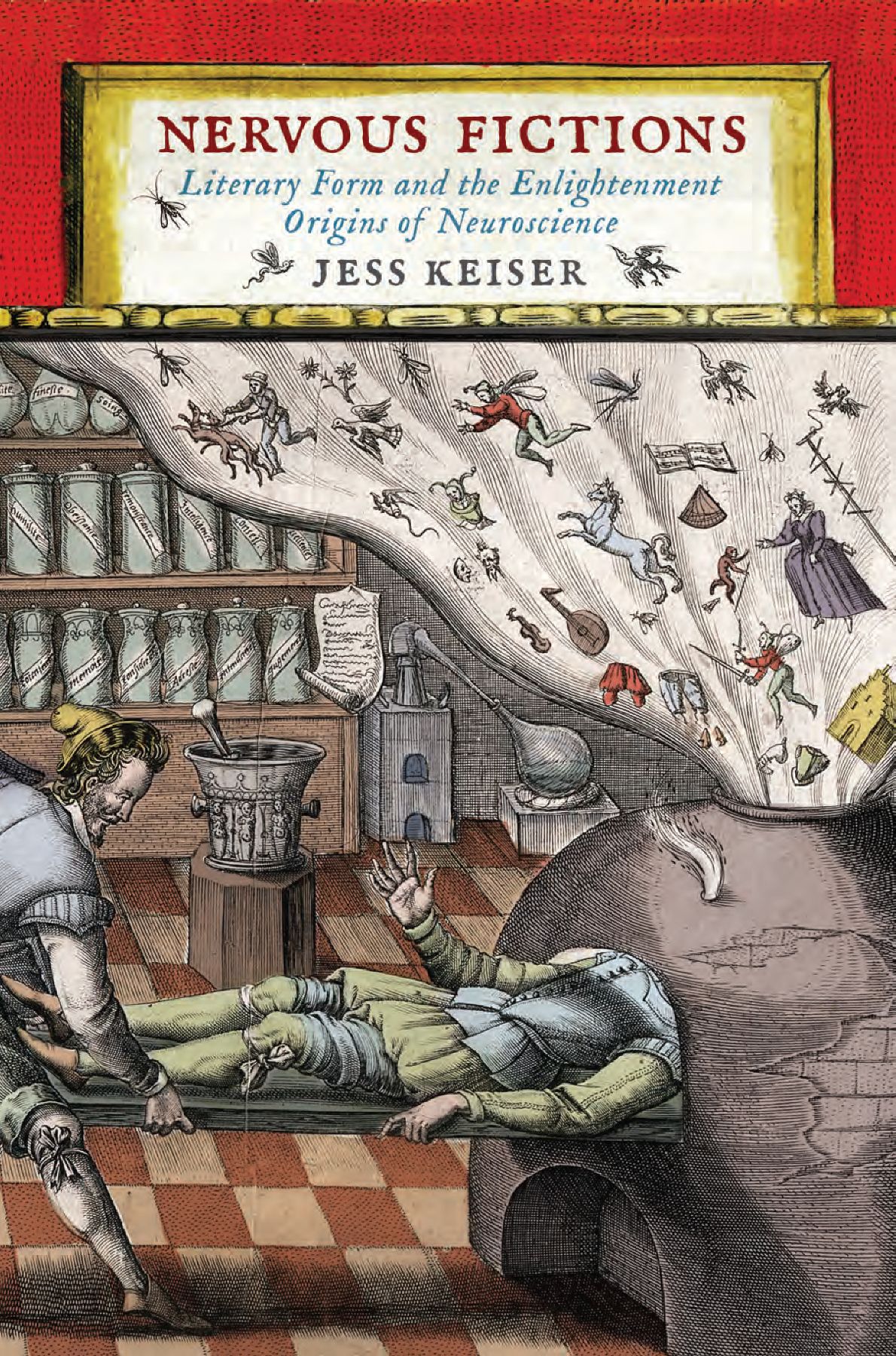
Jess Keiser
University of Virginia Press
Charlottesville and London
University of Virginia Press
2020 by the Rector and Visitors of the University of Virginia
All rights reserved
Printed in the United States of America on acid-free paper
First published 2020
1 3 5 7 9 8 6 4 2
Library of Congress Cataloging-in-Publication Data
Names: Keiser, Jess, author.
Title: Nervous fictions : literary form and the enlightenment origins of neuroscience / Jess Keiser.
Description: Charlottesville : University of Virginia Press, 2020. | Includes bibliographical references and index.
Identifiers: LCCN 2020024974 (print) | LCCN 2020024975 (ebook) | ISBN 9780813944777 (hardcover) | ISBN 9780813944784 (paperback) | ISBN 9780813944791 (ebook)
Subjects: LCSH: Literature and scienceEnglandHistory17th century. | Literature and scienceEnglandHistory18th century. | Mind and body in literature. | Science in literature. | Metaphor. | NeurosciencesEnglandHistory.
Classification: LCC PR438.S37 K45 2020 (print) | LCC PR438.S37 (ebook) | DDC 820.9/3561dc23
LC record available at https://lccn.loc.gov/2020024974
LC ebook record available at https://lccn.loc.gov/2020024975
Cover art: A surgery where all fantasy and follies are purged and good qualities are prescribed, M. Greuter, line drawing, ca. 1600 (Wellcome Collection); antique map detail, seventeenth century (picturepast/123RF)
For my parents
I first want to thank my teachers at Cornell: Rick Bogel, Laura Brown, and Neil Saccamano. They helped this book along in its earliest, most halting stages, and in doing so, they made it possible to thrive. As I continued to work on the book over the years, I often found myself writing to thema true testament to their inspiring teaching and mentorship.
I also owe special thanks to a number of Cornell faculty for their encouragement, expertise, and mentorship: Kevin Attell, Cynthia Chase, Elisha Cohn, Amanda Jo Goldstein, Michael Jonik, Rayna Kalas, Phil Lorenz, and Jenny Mann. I developed many of the ideas in this book in conversation with numerous friends at Cornell. Bradley Depew, Ryan Dirks, Paul Flaig, and Aaron Hodges were particularly helpful. For their unflagging friendship over the years, Jacob Brogan, Cecily Swanson, Seth Perlow, and Caetlin Benson-Allott deserve special and wholly inadequate thanks.
Sarah Ellenzweig and Nancy Yousef have been two of my most important mentors. They read parts of this book and made it better. Most importantly, they believed in this project when I most badly needed it to be believed in, and for that I will be forever thankful. Thanks to Sarah and to Jack Zammito, I was able to develop important aspects of this book during a year at Rice Universitys Humanities Research Center. I especially want to thank my compatriots during that year. They helped me develop, strengthen, and nuance many of the ideas here. They include Keith Ansell-Pearson, Christian Emden, Mark Kulstad, Ian Lowrie, Lenny Moss, Angie Willey, Catherine Wilson, and Derek Woods. During my time at Rice, I also got to know Charles T. Wolfe, who has been an immense help in navigating early natural philosophy and intellectual history.
I have been extraordinarily lucky in my mentors and friends in eighteenth-century studies. They are an ideal audience and a group of people from whom Ive learned an immense amount. I especially need to acknowledge Al Coppola and Courtney Weiss Smith for all their helpimpossible to quantify or to ever repay. I also owe special thanks to Rick Barney, Frank Boyle, Lucinda Cole, Joe Drury, Jonathan Kramnick, Thomas Salem Manganaro, Brad Pasanek, Sean Silver, and Helen Thompson for talking over many of the ideas in this book over the years. Their insight and generosity have made every page better. For advice, encouragement, and intellectual excitement, I want to thank Dave Alff, Dave Alvarez, Misty Anderson, Leah Benedict, Tita Chico, Dwight Codr, Lynn Festa, Mike Genovese, Kevis Goodman, Dan Gustafson, Stephanie Hershinow, Suvir Kaul, Heather Keenleyside, Crystal Lake, Sue Lanser, Wendy Anne Lee, Yoon Sun Lee, Devoney Looser, Kathy Lubey, Deidre Lynch, Ramesh Mallipeddi, Bob Markley, Sandra Macpherson, Laura Miller, Chris Mounsey, Stephen Osadetz, Ruth Perry, Melinda Rabb, Katie Sagal, Wolfram Schmidgen, Joel Sodano, Danielle Spratt, Rajani Sudan, Kate Thorpe, Mark Vareschi, Beth Wallace, and Alexander Wragge-Morley.
Although I began this book in Ithaca, I finished it in Cambridge and Boston. A group of friends (new and old) made that possible. Sarah Eron, Rob Lehman, Andrew Warren, and Audrey Wasser have been my best and most trusted readers. I also want to thank members of the Dialectical Reading Group at Harvard (especially Carly Yingst and Matthias Rudolf). My students at Washington and Lee and at Tufts have been my best interlocutors. Nick Belmore and Collin Cook were particularly helpful and inspiring as I developed this project. I also want to thank David Auerbach for generously discussing Sellars and philosophy of mind with me. My colleagues at Washington and Lee were extraordinarily helpful. I want to thank Lesley Wheeler in particular for all that she has done.
The English department at Tufts has shaped me in ways that are too profound to ever properly put into words. When I was an undergraduate student there, the faculty taught me how to read, write, and think about literature. Now theyve supported me as Ive put their lessons into practice. So thanks to all my colleagues at Tufts: Liz Ammons, Jay Cantor, Ricky Crano, John Fyler, Julia Genster, Judith Haber, Sonia Hofkosh, Joe Litvak, Lisa Lowe, Neil Miller, Modhumita Roy, Natalie Shapero, Christina Sharpe, Ichiro Takayoshi, Greg Thomas, and Michael Ullman. I cant imagine writing this book without them. John Lurz and Nate Wolff deserve special thanks for their friendship, intellectual generosity, and advice, both minor and major, along the way. Anyone who has been taught by Linda Bamber is lucky, but I am particularly lucky for all that she has imparted to me over the years. Lee Edelman has been one of the most important presences in my life. He showed me howand whywe should read literature. His support has made all of this possible.
Everyone at the University of Virginia Press deserves acknowledgement. Angie Hogan, in particular, has been one of the best editors I could imagine. She has supported this project in so many wayslarge and small, subtle but significantthat it would require an acknowledgments section longer than the actual book to thank her adequately.
My work has been supported by a generous postdoctoral fellowship at Rice Universitys Humanities Research Center and a junior faculty leave at Tufts University. I presented ideas from this book to audiences at various ASECS and NEASECS meetings, at Columbia, Harvard, Rice, Wesleyan, and the Samuel Johnson Society of the Central Region. My thanks to the participants at all these talks. Parts of the introduction and chapter 1 first appeared in ELH, volume 82, issue 4, 2015. Copyright 2015 The Johns Hopkins University Press. It is reprinted with permission from the journal. A few paragraphs in the introduction also appeared in Reasoning Beasts: Evolution, Cognition, Culture,17201820, edited by Kathryn Duncan (AMS Press, 2017), and they are reprinted with permission from the press. An early version of chapter 3 appeared in The Idea of Disability in the Eighteenth Century,
Font size:
Interval:
Bookmark:
Similar books «Nervous Fictions»
Look at similar books to Nervous Fictions. We have selected literature similar in name and meaning in the hope of providing readers with more options to find new, interesting, not yet read works.
Discussion, reviews of the book Nervous Fictions and just readers' own opinions. Leave your comments, write what you think about the work, its meaning or the main characters. Specify what exactly you liked and what you didn't like, and why you think so.

